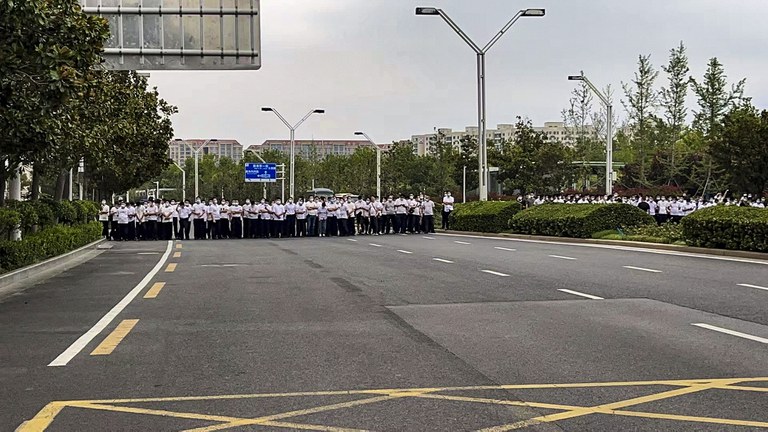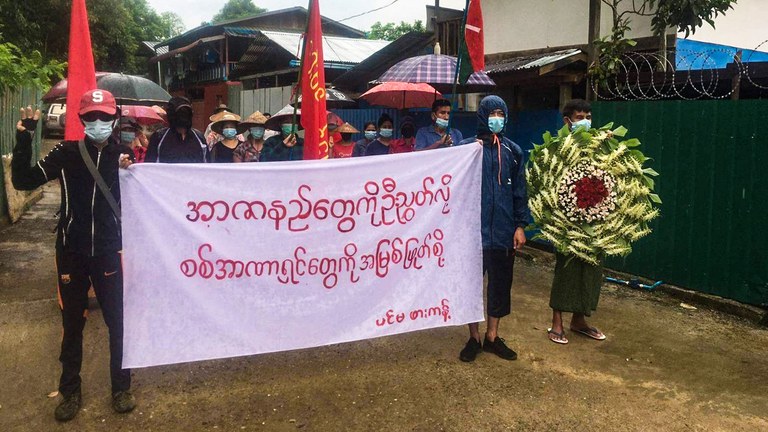Top UN court rejects Myanmar objections in Rohingya genocide trial
The International Court of Justice (ICJ) rejected on Friday all of Myanmar’s objections to a case brought against it by Gambia that accuses the Southeast Asian country of genocide against the mainly Muslim Rohingya minority. Myanmar’s military regime had lodged four preliminary objections claiming the Hague-based court does not have jurisdiction and that the West African country of Gambia did not have the standing to bring the case over mass killing and forced expulsions of Rohingya in 2016 and 2017. The ruling delivered at the Peace Palace in the Dutch city of The Hague by ICJ President, Judge Joan E. Donoghue, clears the way for the court to move on to the merits phase of the process and consider the factual evidence against Myanmar, a process that could take years. Donoghue said the court found that all members of the 1948 Genocide Convention can and are obliged act to prevent genocide, and that through its statements before the U.N. General Assembly in 2018 and 2019, Gambia had made clear to Myanmar its intention to bring a case to the ICJ based on the conclusion of a UN fact-finding mission into the allegations of genocide. “Myanmar could not have been unaware of the fact that The Gambia had expressed the view that it would champion an accountability mechanism for the alleged crimes against the Rohingya,” the judge said. The military junta that overthrew Myanmar’s elected government in February 2021 is now embroiled in fighting with prodemocracy paramilitaries across wide swathes of the country, and multiple reports have emerged of troops torturing, raping and killing civilians. In the initial hearing of the case in 2019, Gambia said that “from around October 2016 the Myanmar military and other Myanmar security forces began widespread and systematic ‘clearance operations’ … against the Rohingya group.” “The genocidal acts committed during these operations were intended to destroy the Rohingya as a group, in whole or in part, by the use of mass murder, rape and other forms of sexual violence, as well as the systematic destruction by fire of their villages, often with inhabitants locked inside burning houses. From August 2017 onwards, such genocidal acts continued with Myanmar’s resumption of ‘clearance operations’ on a more massive and wider geographical scale.” Thousands died in the raids in August 2017, when the military cleared and burned Rohingya communities in western Myanmar, killing, torturing and raping locals. The violent campaign forced more than 740,000 people to flee to squalid refugee camps in neighboring Bangladesh. That exodus followed a 2016 crackdown that drove out more than 90,000 Rohingya from Rakhine. The Gambia has called on Myanmar to stop persecuting the Rohingya, punish those responsible for the genocide, offer reparations to the victims and provide guarantees that there would be no repeat of the crimes against the Rohingya. The Myanmar junta’s delegation protested at a hearing on Feb. 25 this year, saying the ICJ has no right to hear the case. It lodged four objections, all of which were rejected by the ICJ on Friday. The ICJ is the principal judicial organ of the United Nations and was established in 1945 to settle disputes in accordance with international law through binding judgments with no right of appeal. The U.S. has also accused Myanmar of genocide against the Rohingya. Secretary of State Antony Blinken ruled in March this year that “Burma’s military committed genocide and crimes against humanity with the intent to destroy predominantly Muslim Rohingya in 2017.” The State Department said the military junta continues to oppress the Rohingya, putting 144,000 in internal displacement camps in Rakhine state by the end of last year. A State Department report last month noted that Rohingya also face travel restrictions within the country and the junta has made no effort to bring refugees back from Bangladesh. Myanmar, a country of 54 million people about the size of France, recognizes 135 official ethnic groups, with Burmans accounting for about 68 percent of the population. The Rohingya, whose ethnicity is not recognized by the government, have faced decades of discrimination in Myanmar and are effectively stateless, denied citizenship. Myanmar administrations have refused to call them “Rohingya” and instead use the term “Bengali.” The atrocities against the Rohingya were committed during the tenure of the civilian government of Aung San Suu Kyi, who in December 2019 defended the military against allegations of genocide at the ICJ. The Nobel Peace Prize winner and one-time democracy icon now languishes in prison — toppled by the same military in last year’s coup. In February, the National Unity Government (NUG), formed by former Myanmar lawmakers who operate as a shadow government in opposition to the military junta, said they accept the authority of the ICJ to decide if the 2016-17 campaign against Rohingya constituted a genocide, and would withdraw all preliminary objections in the case. “It is hard to predict how long this case could take to reach the final verdict. Most likely it could take several years, even a decade,” said Aung Htoo, a Myanmar human rights lawyer and the principal at the country’s Federal Legal Academy. Written by Paul Eckert.





